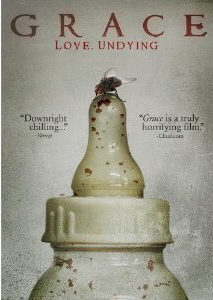
The idea of the 'monstrous feminine' is a fairly established idea in criticism, be it literary or otherwise - and, in horror cinema, there are a number of interesting extensions of this idea to include what has been termed the 'monstrous maternal' - women at the mercy of their bodies and their instincts who are increasingly trapped, isolated or threatened by the condition of pregnancy or birth. Some recent films like Inside (2007) have really pushed these themes to a gruesome conclusion. Grace: Love Undying (2009) manages to encompass both the realistically bloody nature of childbearing with the much more quiet, understated but escalatingly tense feel of archetypal pregnancy horror Rosemary's Baby (1968). There are definite parallels between Grace and the latter film; in both, a woman's relationship with her newborn baby is of paramount importance, and a mother is practically a slave to her maternal instincts, regardless of the bizarre, harmful situation her maternal instincts have placed her in. Grace however is also a much more visceral film; it does not shy away from the mechanics of what happens to the body during or after birth, and develops this further by introducing the grisly principle of how baby Grace feeds. In this respect, this is body horror, of a new and subtle kind.
Young couple Madeleine (Jordan Ladd) and Michael (Stephen Park) are awaiting the birth of their first child, after losing a previous pregnancy to miscarriage. It's a happy time, but still one fraught with concern. Madeleine is understandably anxious and scared of the medicalised nature of a conventional hospital birth, wanting instead to opt for a holistic-style home birth - much to the chagrin of her strident mother-in-law Vivian (Gabrielle Rose), who has very definite ideas on motherhood and on how her silly daughter-in-law ought to proceed.
When Madeleine is hospitalised later in her pregnancy she is doubly determined to avoid the one-size-fits-all, invasive style of care she receives there, regardless of Vivian's feelings. On her way from this hospital, however, events overtake her. There is a car accident, and it seems like she has lost everything that mattered to her, including her pregnancy. Distraught, Madeleine decides to carry the dead baby to term but - after a harrowing stillbirth - somehow, as she cradles the tiny corpse, baby Grace comes back to life.
The sinister creep in the film really begins to take hold from here on in. Increasingly isolated and obviously traumatised, Madeleine concentrates purely on caring for her 'miracle baby'. But there is something very wrong with Grace…when she feeds it is not to take milk, but human blood. Meanwhile, Vivian - a highly effective maternal monster - shifts her attention (and thwarted instincts) onto claiming baby Grace for herself when she finds out that her granddaughter is actually alive, and not stillborn, as Madeleine claimed. Both women grow increasingly desperate to care for this child at any cost, as Madeleine retreats into a lonely world of being routinely drained of blood whilst Vivian dreams of being a mother again.
This is a gem of a film, a highly original spin on a minor horror staple. It layers strange upon strange in a way that renders it quietly nightmarish, though it derives a good share of its impact from the use of bloody, gruelling elements within it (which are so often omitted or glossed over in depictions of childbearing in film). What is the real horror here? It seems that Madeleine's plight is as much loneliness and confusion as the unsettling and bizarre nature of her life with Grace. It really is unpleasant to watch her grow desperate, ill and afraid as she is attempts anything, at the expense of her health and sanity, just to keep her child fed. Frequent glimpses at her television showing either animals giving birth/ suckling or slaughterhouse footage reinforces the idea that Madeleine is just like them - an animal, following instincts, and just as much at risk of being bled dry.
A surprise ending very much leaves the events retold here open to interpretation. Ultimately, Grace does not choose to explain itself. I feel this approach is actually to the credit of the film. It allows it to retain the ambivalence and mystique which pervades throughout; you are not, at the end, invited to fully understand or to judge it overall. This is an atmospheric story which develops some real pathos along the way - it's certainly one of the most unsettling, memorable horrors I've seen in some time.
Review by Keri O'Shea
| Released by Starz/Anchor Bay |
| Region 1 - NTSC |
| Not Rated |
| Extras : |
| see main review |